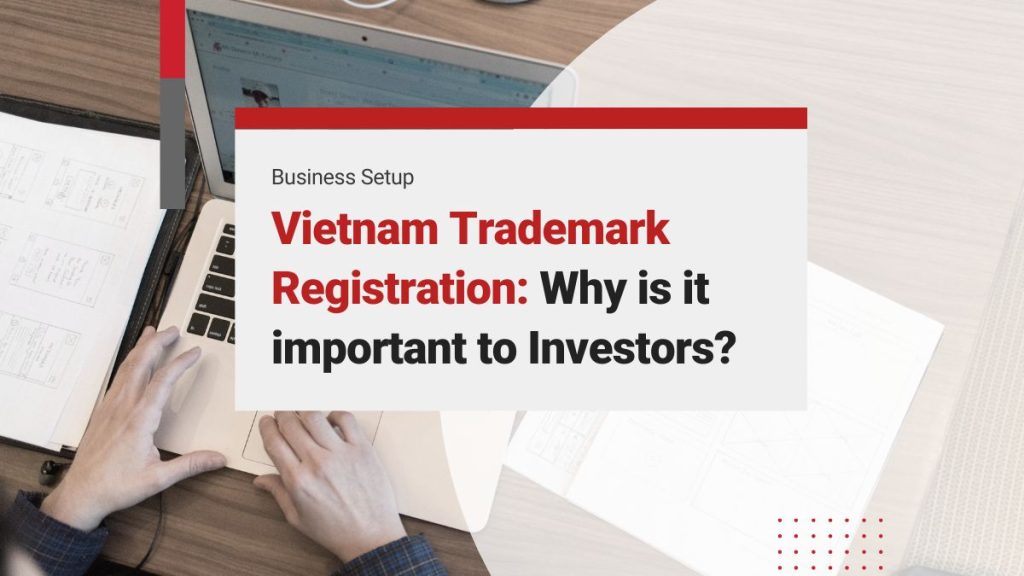In navigating the complex terrain of conducting business in a foreign landscape such as Vietnam, one pivotal question demands attention: “Is my company adequately protected?” Amidst the myriad considerations that foreign entrepreneurs encounter, certain vital aspects are often overlooked, potentially exerting a profound impact on their business ventures. In this context, we emphasize the absolute necessity of trademark registration in Vietnam.
Trademarks are vital shields for brand protection, essential for businesses to safeguard against copyright infringements. Understanding the trademark registration process is crucial for growth, as trademarks are among the most valuable assets. Investing time in this process is essential to fortify your business presence. In Vietnam, securing a trademark is pivotal to protecting your brand. However, the registration process is complex and requires careful adherence to various steps.
Searching for Trademark solutions for your business in Vietnam? Check out InCorp Vietnam’s Trademark Registration Services
What is a Trademark?
A trademark serves as the distinctive symbol, brand name, logo, or identifier linked to the goods or services offered by a company or individual. It may include a combination of words, letters, numerals, symbols, or a unique amalgamation of these elements. The fundamental purpose of a trademark lies in its capacity to unequivocally identify and differentiate the products or services of a particular company from those of its competitors.

Following Article 4.16 of the Vietnam IP Law, a trademark is elucidated as a sign employed to distinguish the goods or services of disparate organizations or individuals. The legal framework in Vietnam classifies trademarks into five distinct types:
(i) Trademark including Service Mark: This category encompasses any sign utilized to differentiate goods and/or services among diverse organizations or individuals, as outlined in Article 4.16 of the Vietnam IP Law.
(ii) Collective Mark: Defined under Article 4.17, a collective mark serves as a means to differentiate the goods and/or services of members from those of non-members within an organization that owns the mark.
(iii) Certification Mark: As stipulated in Article 4.18, a certification mark is authorized by its owner for use by another organization or individual on their goods and/or services. Its purpose is to certify various aspects such as origin, raw materials, manufacturing processes, quality, safety, or other characteristics of the goods and/or services bearing the mark.
(iv) Associated Mark: Described in Article 4.19, an associated mark refers to identical or similar marks registered by the same entity. These marks are intended for use on products or services that are of the same type or exhibit interrelation.
(v) Well-Known Mark: As per Article 4.20, a well-known mark is one widely recognized by consumers across the Vietnamese territory.
Why is Trademark Registration important in Vietnam?
Coping with Competitors
The initial stride toward safeguarding investments and the brand itself is through registration. Frequently, in the fervor of establishing a new business, companies overlook the critical importance of registering their trademark. However, this oversight can expose them to the risk of competitors securing the same name or identifier.
The proactive registration of a trademark serves as a shield, preventing competitors from appropriating the essence of the company. As a business gains recognition and popularity, the challenge of establishing ownership becomes more intricate. Registering a trademark is a strategic move to counteract potential imitations by competitors seeking to capitalize on the brand’s success.
In instances where a business attains widespread recognition, failure to register a trademark can pose significant challenges in proving legitimate ownership. This vulnerability heightens the risk of competitors imitating the brand, leading to potential trust issues with clients. The establishment of a trademark not only fortifies legal defenses but also safeguards the trust cultivated with clients over time, ensuring the brand’s integrity and distinctiveness remain intact.
At its core, a trademark serves the paramount purpose of distinguishing goods and services from their competitors, forging a unique brand identity. The act of trademark registration is pivotal in streamlining the commercialization or marketing of a product or service, aligning it seamlessly with market demands. The brand identity, encapsulated within the trademark, becomes a communicative vessel for the company’s essence — a representation of its quality, vision, and various other distinctive features.
Having Exclusive Rights and Advantages under the Legal System
Trademark registration bestows a distinct advantage—the legal presumption of exclusive rights to the trademark. This privilege empowers you with the sole entitlement to utilize the trademark throughout the country, fortified by the legal authority to initiate legal proceedings against any unauthorized use by others.
The trademark certificate, a tangible testament to your legitimate ownership, serves as a formidable shield for your brand or symbol. This official documentation not only acts as a deterrent against unauthorized usage but also functions as irrefutable proof of your rightful ownership in legal contexts. In the event of infringement, the assurance of ownership encapsulated in the trademark certificate positions you favorably in legal proceedings, providing a solid foundation for the protection of your brand.
This formalized registration serves as a powerful assurance to customers, signaling that the goods or services offered by the business are truly unique within the market landscape. Trademark registration extends to shielding against confusion in the minds of the public. It acts as a deterrent, preventing unauthorized usage of a similar trademark for similar goods or services, ultimately classifying such usage as infringement. This legal recognition grants the trademark owner exclusive rights, enabling application across all products or goods falling under the registered classes.
Crucially, trademark registration empowers the trademark owner with the exclusive right to take legal action against third parties engaging in the unauthorized use of a similar or identical mark for their products.
Enhancing Business Value through Trademark Registration
The status of a registered trademark extends beyond mere identification—it transforms into a prized intellectual property, a valuable asset embedded within your business portfolio. Intellectual property, encompassing intangible creations safeguarded by law, finds a noteworthy embodiment in the form of a registered trademark. This legal shield not only fortifies your brand identity but also unfurls pathways for strategic business expansion and financial prosperity.
A compelling facet of owning a registered trademark lies in its potential as a tradable commodity. Similar to tangible assets, your trademark assumes a marketable dimension, presenting opportunities to leverage its inherent value. This may involve transactions such as selling the rights to your trademark, licensing it for specific uses, or embarking on franchising endeavors to replicate your brand’s success across diverse locations.
In the consumer’s perception, the quality of a product becomes intricately entwined with the brand it bears. A registered trademark, therefore, serves as a powerful tool in crafting and communicating an enduring image of unparalleled quality for a specific brand within the market.
Branding Your Company
Beyond its legal implications, your trademark is the very embodiment of your brand essence. It serves as a visual ambassador that enables your target audience or customers to promptly distinguish and connect with your business in the vibrant marketplace of Vietnam.
Functioning as a dynamic communicator, your trademark conveys essential messages about your identity, offerings, values, and ethos to your audience. Its integration into your branding and marketing strategy is pivotal, transforming it into a magnetic force that attracts potential customers. The establishment of a positive connection, facilitated by the immediate recognition of your trademark, fosters customer loyalty and encourages repeated engagement.
Moreover, your company’s trademark stands as a hallmark of authenticity. It imparts credibility to your business, acting as a catalyst for collaborations, amplifying sales, and augmenting profits. A reputable trademark sets the stage for a climate of trust and assurance, paving the way for valuable partnerships and heightened commercial success.
Trademark registration offers additional advantages by fostering goodwill and trust in a brand. As a brand gains popularity among customers, its goodwill grows. This, in turn, cultivates a base of loyal customers who consistently choose and support the brand. Trademark registration becomes a key driver in building and maintaining this community of devoted patrons.
The positive impact of a reputable trademark extends beyond customer loyalty to financial opportunities. Brands with a strong image and customer trust find it easier to secure funds from financial institutions.
Dealing with Fake Products in Vietnam’s Market
Trademark registration serves as a formidable defense against the infiltration of counterfeit or substandard goods into the market. This proactive measure not only eliminates customer confusion but also fortifies the legitimacy of your products. The distinction granted by a registered trademark acts as a shield, preserving the integrity of your brand and ensuring that customers receive genuine, quality products.
In instances where counterfeiters breach your trademark rights, the legal recourse becomes a potent tool. Pursuing legal action against such infringements not only safeguards your brand’s credibility but also serves as a deterrent, discouraging illicit activities in the marketplace.
Upon successful trademark registration, the owner gains the privilege to utilize the Ⓡ symbol alongside the logo. This symbol holds significant weight, serving as a clear signal to third parties that the trademark is registered and off-limits for unauthorized use.
When dealing with instances of infringement on platforms like websites, operators often request proof of trademark registration before taking any corrective actions. A notable example is Amazon’s Brand Registry, a trademark protection program that mandates trademark registration as a prerequisite for enrollment. This requirement underscores the importance of having a registered trademark to bolster your defense against online infringement.
Moreover, in instances of trademark infringement, the legal system holds the authority to issue impactful remedies. The court, as an arbitrator, can mandate the cessation of the third party’s use of the registered trademark. Beyond halting unauthorized usage, the court can also order the restitution of profits garnered through the unauthorized use of the trademark back to the registered owner.
Some Restrictions of Vietnam Trademark Registration
Immutability of Trademark Classes
One notable challenge in trademark management is the inability to alter trademark classes. The initial selection of relevant classes during the application process determines the scope of protection. Unfortunately, once the application is submitted, adding more classes is not allowed. This limitation may pose difficulties for businesses that evolve or pivot in their offerings after the initial application.
Litigation Complexities
Engaging in trademark litigation presents another hurdle. Enforcing trademark rights falls on the owner, necessitating actions like cease and desist letters or legal proceedings. The subjective nature of determining deceptive similarity between two trademarks adds complexity to litigation. This subjectivity can make legal actions time-consuming and expensive.
Renewal Burden
Trademark renewals required every 10 years, introduce a regular and potentially costly aspect of trademark ownership. Failing to renew on time leads to removal from the trademark register, emphasizing the importance of diligent renewal management. For businesses with extensive trademark portfolios, this process can become particularly burdensome.
Limited Protection Scope
Trade marks primarily safeguard the branding of goods and services, leaving the products or services themselves unprotected. This limitation necessitates businesses to seek additional intellectual property (IP) protections, such as patents for new inventions. Trademarks alone may not provide comprehensive coverage for all aspects of a business’s intellectual property.
Genericization Risk
Well-known trademarks face the risk of becoming genericized, where consumers associate the brand with the product itself. While this indicates market dominance, it jeopardizes the legal protection of the trademark. Owners must take proactive measures, like consumer education, to mitigate the risk of genericization and preserve the distinctiveness of their trademark.
What’s Eligible for Vietnam Trademark Registration?
Several elements are eligible for trademark registration in Vietnam, with some considerations to ensure compliance. While certain scenarios may render the requirements inapplicable, such as common surnames or close resemblance to existing trademarks, the process becomes more straightforward when the name is uniquely invented, potentially incorporating various features. These include letters, numbers, symbols, and shapes.
At InCorp Vietnam, our expertise can guide you through this process, offering clarity and assistance in navigating the intricacies of trademark registration.
National Protection and International Protection
In Vietnam, businesses have the option to pursue either local or international protection, in terms of trademark registration, each serving distinct purposes.
- Local trademarks are particularly pertinent for companies establishing and operating solely within Vietnam.
- International trademarks come into play for businesses with aspirations beyond Vietnam’s borders.
What is the Vietnam Trademark Registration Fee?
Trademark registration fees in Vietnam are determined by the number of classes within a trademark and the quantity of goods/services falling under each class. The fee structure is variable, and the minimum filing fee for a trademark with a single class can commence at US$190.00.
– Filing Fee: VND 150,000 VND (~US$6)
– Examination Fees
- Search Fee for Content: VND 180,000/Class (~US$7%)
- Search Fee for the 7th Goods/Service Onwards: VND 30,000/Goods/Service (~US$1)
- Content Examination Fee: VND 550,000/Class (~US$22)
- Content Examination Fee for the 7th Goods/Service Onwards: VND 120,000/Goods/Service (~US$5)
- Priority Claim Examination Fee: VND 600,000/Application/Request (~US$25)
– Publication and Registration Fees
- Application Publication Fee: VND 120,000 (~US$5)
– Certificate Granting Fee
- Fee for Publication of Decision on Granting a Protective Certificate: VND 120,000 (~US$5)
– Usage and Certificate Fees
- Fee for Using the Protective Certificate (for each class for 10 years): VND 700,000 (~$29)
- Fee for Granting a Certificate of Trademark Registration: VND 120,000 (1st Class, VND 100,000/Class thereafter) (~US$5, US$4)
– International Registration Procedures Fee
- Fee for Procedures for International Registration of Trademarks of Vietnamese Origin: VND 2,000,000 (~US$82)
Read More: How to Register a Trademark in Vietnam for Your Business?
Process of Trademark Registration in Vietnam
The process of trademark registration in Vietnam involves a series of stages. Here’s a brief overview:
- Submission of documents
- Formality Examination and Publication of Application
- Substantive Examination of the Trademark Application
- Issuance of Registration Certificate

Registration of a trademark typically takes between 12-18 months. The registered trademark enjoys a 10-year legal protection, with the option for renewal upon expiration.

Still confused about Trademark Registration in Vietnam? Talk to our experts now!
About Us
InCorp Vietnam is a leading market entry and corporate services firm in Vietnam. We are part of InCorp Group, a regional leader in corporate solutions that encompasses 8 countries in Asia-Pacific, headquartered in Singapore. With over 1,200 legal experts serving over 15,000 Corporate Clients across the region, our expertise speaks for itself. We provide transparent legal consulting, setup, and advice based on local requirements to make your business fit into the market perfectly with healthy growth.
Don’t take our word for it. Read some reviews from some of our clients.









